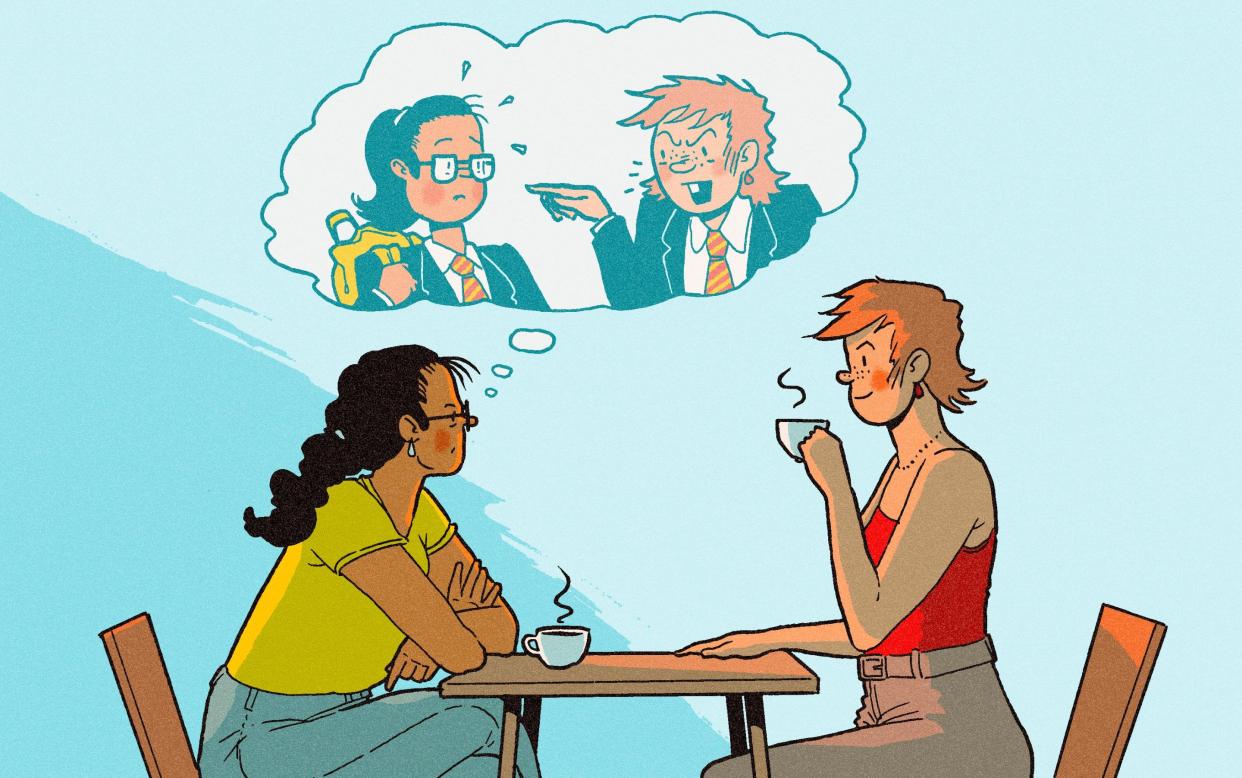My husband's best friend is dating the girl who bullied me at school. Should I confront her?

Dear A&E,
My husband’s best friend has started dating a girl who used to bully me badly for the first two years of secondary school. My husband is hoping we can all hang out as a foursome and they are busy planning holidays, but I feel incredibly stressed about it.
Do you think I should try to talk things through with her? What should I say?
– Help, love Bullied
Dear Bullied,
Oh Bullied, this must be so difficult for you. You’ve found your place in the world and then in sashays the person who used to make you feel as though you didn’t deserve that place.
It’s a serious thing to find yourself in early adolescence at the mercy of a harasser. People who have been bullied tend to carry that sense of their wrongness, of their victimhood, into their adult lives, and are often vulnerable to mental health issues. We all know how crushing it feels when someone unleashes a campaign of terror against you.
We both have people in our pasts (one from primary school and one from secondary school) who we would cross the street/restaurant/planet to avoid at all costs – let alone give them a hero’s welcome into our lives. Emilie once walked into a new job and one of the punchier, more dominant girls from her year was there. This girl immediately tried to get Emilie sacked: clearly the ghosts of playgrounds past are never welcome. And the bullies often feel as avoidant as the bullied. Shame, you see.
Of course, you are stressed. Your reaction to her appearance in your life is that of your inner schoolgirl. And she should be heard. She probably wasn’t heard back then. You need to validate those feelings, past and present, because otherwise they can come out in horrible ways – you might find yourself reverting back to those adolescent coping mechanisms: withdrawal, moodiness, lack of communication, for example.
You may have moved on. But while you can forgive people at a distance, when they appear at your birthday parties or at your child’s christenings, it can feel really polluting. You don’t want to feel like a second-class citizen again.
So don’t push yourself to the back of the queue with this. Lean in. It’s much easier to set boundaries now, at the beginning of your husband’s friend’s relationship, than find yourself 10 years into faking a friendship, feeling furious and powerless. A line has to be drawn.
First and foremost, you need to communicate with your husband. No one likes to admit they were bullied – that is part of the bully’s power. No one likes to say, “Hey, I wasn’t always the glorious, confident sensation that you fell in love with.” But you are not going to resolve this unless you have that conversation with your husband and tell him exactly how you feel. You need to be united in what you decide to do, and if your distress is still operational, he needs to hear that. Your self-esteem and your marriage are the priority here, not fussing around a new couple.
People often fall in love with and marry unhelpful people. If you say “I don’t want to ever go on holiday with this woman”, you are not destroying your husband’s friendship. That pack mentality of school and university tends to dissolve in our 20s, and so it should; otherwise lives are preserved in a strange social aspic that might not let people breathe, grow and change.
We also want to make it clear it is not your responsibility to make this OK. If you feel distressed about being around her forever, then you feel distressed about being around her forever. We don’t think you need to approach her, you just need to hold your boundary. And if she approaches you, then listen, but take your time to decide how to respond. You are under no obligation to whitewash her mistakes. If anyone says anything along the lines of “It happened a million years ago, just let it go”, you are perfectly entitled to tell them to get lost. They weren’t the 13-year-old scared to go to school, scared of break time, scared of the walk home.
One of the few perks of being a grown-up is that you get to decide (mostly) who to spend time with. We learn, wherever possible, not to engage with people who make us feel bad about ourselves. Put yourself first, Bullied. Your inner schoolgirl will thank you. You will be honouring her. And that will make you stronger.
More from the Midults:
What readers advised in response to last week's problem: 'I’m 39 and desperate for a baby, but I don’t find my partner attractive'
@Daniel Carter: 'One of the most common regrets old people have on their deathbed is spending their life with the wrong partner. You have the opportunity to stop two people making this mistake.'
@Florian Bierman: 'She should accept that the guy she has is what she can get and appreciate him for his family-supporting qualities. A "hot" guy is not necessarily the best for raising a family.'


